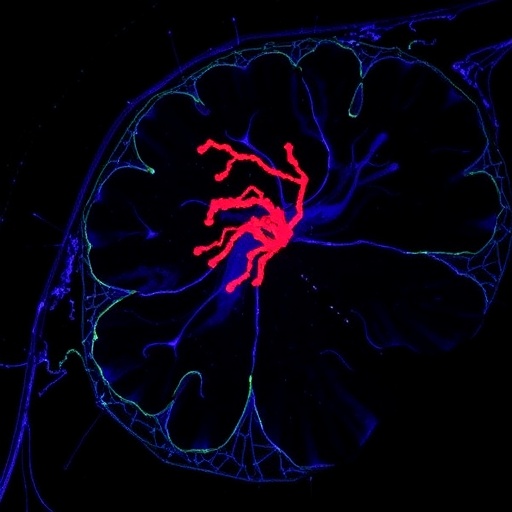In a groundbreaking advance in cancer immunology, researchers have unveiled the pivotal role of interferon-gamma (IFNγ) in orchestrating an anti-tumor immune response within the leptomeninges, the delicate membranes enveloping the brain and spinal cord. This discovery elucidates how the immune microenvironment in the leptomeninges mediates resistance against metastatic cancer cells and spotlights novel cellular interactions that could redefine therapeutic strategies against leptomeningeal metastasis (LM).
Natural killer (NK) cells, well-known cytotoxic effectors specialized in targeting tumor cells, have emerged as central players in this leptomeningeal defense. Detailed analysis in murine models revealed that the leptomeninges harbor a diverse NK cell repertoire encompassing naive, activated, proliferative, and—importantly—a subset of senescent NK cells, the latter appearing predominantly in the context of cancer. Parallel investigations into human cerebrospinal fluid (CSF) confirmed the existence of analogous NK subsets, underscoring the translational relevance of these findings.
Intriguingly, the overexpression of IFNγ in the leptomeninges augmented NK cell proliferation independently of cancer presence, a phenomenon preserved even when cancer was introduced. This IFNγ-driven expansion suggests that IFNγ serves as a potent immunomodulatory signal, priming NK cells to mount an effective anti-tumor response in this specialized CNS compartment.
Dissecting the molecular dialogue underpinning this immune orchestration, the study highlighted the significant interaction between leptomeningeal CCR7-positive conventional dendritic cells (cDCs) and NK cells. Using advanced single-cell technologies such as CITE-seq combined with t-SNE analysis, researchers demonstrated that CCR7-positive DCs secrete vital cytokines including interleukin-12 (IL-12) and interleukin-15 (IL-15), both of which critically sustain NK cell survival and proliferation. Importantly, leptomeningeal NK cells express cognate receptors for these cytokines, enabling a precise and effective cellular crosstalk within the tumor microenvironment.
Furthermore, the absence of IFNγ receptor (Ifngr1) on CCR7-positive DCs severely dampened IL-12 production, indicating that IFNγ signaling directly governs cDC cytokine secretion patterns. This axis thus forms a foundation for an IFNγ-dependent immunoregulatory circuit that fine-tunes NK cell functionality.
Corroborating these experimental insights, the study found elevated concentrations of IL-12, IL-15, and IL-18 in the CSF from patients diagnosed with leptomeningeal metastases compared to those without. Single-cell transcriptomic profiling further confirmed the presence of cytokine receptor transcripts in human leptomeningeal NK cells, reinforcing the notion that this cytokine-mediated circuit operates in the human disease context.
An epistasis analysis involving mice deficient in IFNγ receptors further clarified the hierarchy of immune signaling: depletion of NK cells in IFNγ-unresponsive hosts did not exacerbate tumor growth, supporting a model where IFNγ signaling acts upstream of NK cell-mediated tumor control. Conditional knockout experiments targeting IFNγ receptors specifically on NK cells confirmed that direct IFNγ sensing by NK cells is dispensable; instead, IFNγ shapes the tumor microenvironment indirectly through DC-derived cytokines.
Additional clinical validation emerged from measurements of NK cell activation in human LM patients, where elevated levels of soluble effector molecules such as Fas ligand, granzyme A, perforin, and granulysin were detected in the CSF. These markers underscore the functional engagement of NK cells in human leptomeningeal immune defense.
Collectively, these insights illustrate a sophisticated immunological network: T cell-derived IFNγ triggers the maturation of leptomeningeal cDCs into CCR7-positive migratory dendritic cells. These specialized DCs then secrete IL-12, IL-15, and IL-18, creating an environment conducive to NK cell activation and proliferation. In turn, NK cells execute cytotoxic functions that suppress metastatic cancer cell expansion within the CNS leptomeningeal niche.
The implications of these findings are profound, revealing previously unappreciated layers of immune regulation within a traditionally immune-privileged site. Therapeutic strategies harnessing or enhancing this IFNγ–DC–NK cell axis could offer novel avenues for the treatment of devastating leptomeningeal metastases, a condition notorious for poor prognosis and limited therapeutic options.
By illuminating cellular and molecular crosstalk at the leptomeningeal frontier, this research not only enhances our understanding of CNS immunity but also extends the therapeutic landscape to encompass modulation of innate and adaptive immune compartments synergistically.
As the scientific community continues to unravel the complexities of tumor-immune interactions in the CNS, the IFNγ-driven pathway emerges as a promising target. Future investigations will undoubtedly explore ways to manipulate this axis, aiming to improve immune surveillance, enhance anti-tumor cytotoxicity, and ultimately improve patient outcomes in metastatic brain cancer.
This pioneering study sets a new benchmark for understanding how innate and adaptive immunity converge in the leptomeninges and spotlights the therapeutic potential of immunomodulation in combating CNS metastases.
Subject of Research: Interferon-gamma-mediated immune orchestration involving NK cells and dendritic cells in leptomeningeal anti-tumor response.
Article Title: Interferon-γ orchestrates leptomeningeal anti-tumour response.
Article References:
Remsik, J., Tong, X., Kunes, R.Z. et al. Interferon-γ orchestrates leptomeningeal anti-tumour response. Nature (2025). https://doi.org/10.1038/s41586-025-09012-z
Image Credits: AI Generated
Tags: cellular interactions in tumor immunitycerebrospinal fluid immune analysisCNS immunomodulation and therapyIFNγ and NK cell proliferationimmune microenvironment in leptomeningesInterferon-gamma in cancer immunologyleptomeningeal anti-tumor immunitymetastatic cancer resistance mechanismsmurine models of cancer immunologynatural killer cells in CNS defenseNK cell subsets in cancertherapeutic strategies for leptomeningeal metastasis





